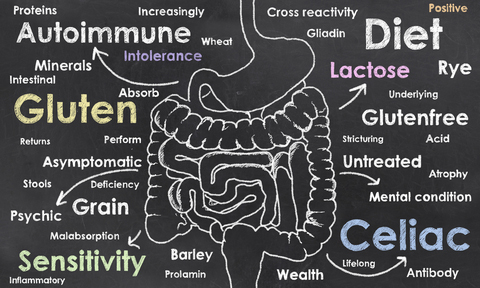by Dr. Craig A. Maxwell
“Gluten intolerance is fake!”
In the past couple of months, more and more articles have been popping up, vehemently denying the validity of non-celiac gluten sensitivity.
The tone of these articles appear to be that of offended disbelief, as though anyone who does not have an official diagnosis of celiac disease is making up their symptoms and following a gluten-free diet for attention.
What concerns me is the authors of these articles appear to have no medical, scientific, or nutritional background.
I’m not sure what prompted this trend but it’s unfortunate and has no scientific validity. As a physician with over 30 years clinical experience, I am here to say gluten intolerance is real and needs to be taken seriously.
Standard Celiac Disease Tests Often Inaccurate
The most common test for gluten intolerance is the AGA test. This test measures sensitivity to gliadin, a protein found only in gluten from wheat. According to studies, up to 34% of children diagnosed with celiac disease did not have gliadin antibodies in their system.
The Anti-Tissue Transglutaminase Test (another common test for gluten intolerance) is only accurate 40% of the time. Antibody tests are notoriously inaccurate when it does not coincide with damage to the small intestine.
You Don’t Have to Have Celiac Disease to be Gluten Intolerant
Celiac disease is an autoimmune disease. If you have this disease, each time you ingest a protein called ‘gluten’ from wheat, barley or rye, your immune system goes on the attack. The small, hair-like structures (villi) in your intestines, which help you absorb nutrients from your food, become flattened and your intestines become inflamed.
In order to be officially diagnosed with celiac disease, you must present with this intestinal damage through an endoscopic test and/or a blood test must reveal antibodies to gluten.
As I mentioned above, it can be very difficult to obtain an accurate diagnosis of celiac disease. However, you do not have to have celiac disease in order to be sensitive to gluten. As a matter of fact, new evidence is emerging that suggests non-celiac gluten sensitivity is up to ten times more common than celiac disease!
A study published by the Journal of Pediatric Gastroenterology and Nutrition[1. http://journals.lww.com/jpgn/Fulltext/2006/10000/Gluten_Reactions__Ten_Times_the_Celiac_Problem.194.aspx] divided children into 3 groups: “Definite celiacs” “Possible celiacs” and “Not-Celiacs”, all of which presented with various gastrointestinal and allergic symptoms.
Not surprisingly, 94% “Definite celiacs” improved on the diet. 75% of the “Possible celiacs” improved on the diet and over half (53%) of the “Not-celiacs” showed marked improvement on the diet as well.
Recent studies have raised the possibility that, beside gluten, wheat amylase-trypsin inhibitors and low-fermentable, poorly-absorbed, short-chain carbohydrates may contribute to the gastrointestinal symptoms experienced by patients with non-celiac gluten sensitivity.
Gluten Intolerance Symptoms are Not Limited to the Gut
Noted neurologist, Dr. David Perlmutter, author of “Grain Brain” understands that gluten intolerance sometimes doesn’t have any affect on the gut at all. However, it can have a profoundly negative effect on the brain and nervous system.
Non-intestinal symptoms of gluten sensitivity may include:
- ADHD
- Anxiety
- Ataxia
- Depression
- Mania
- Schizophrenia
- Insomnia
- Neuropathy
- Headache
- Seizures
- Skin Rash (Dermatitis Herpetiformis)
- Hormonal Imbalance
- Autoimmune Disease
According to a Scandinavian psychiatric study[2. http://www.ncbi.nlm.nih.gov/pubmed/16423158], schizophrenic patients who were placed on a gluten free diet showed a drastic reduction, if not a full remission, of their psychiatric symptoms. Simply removing one protein from the diet “cured” a debilitating psychiatric illness.
A comprehensive article published in Nutrients[3. http://www.ncbi.nlm.nih.gov/pmc/articles/PMC3820047/] cites the recent rediscovery of Non-Celiac Gluten Sensitivity and its link to a multitude of abnormalities in both neurological development and function.
Multiple studies have confirmed that children on the autistic spectrum have been found to have elevated peptides (undigested proteins) in their urine, indicating an inability to digest both gluten and casein, most likely due to leaky gut syndrome. Research has indicated that up to 91% of autistic children placed on a gluten free/casein free diet showed observable improvement in learning and behavior.
Gluten has also been linked to ataxia (uncoordinated body movements and poor balance) because the immune system attacks the part of the gut and nervous system affected by gluten, even in patients without a clinical diagnosis of celiac disease.
In addition to the direct effect gluten can have on your nervous system, it can also contribute to the development of psychiatric and neurological symptoms due to nutritional deficiencies. When your gut remains inflamed and your villi flattened, you are unable to adequately absorb nutrients from food.
Deficiencies in vitamin D3, magnesium, and vitamin B12 have all been linked to significant impairment of mental health.
Autoimmune diseases, namely hypothyroidism and idiopathic thrombocytopenic purpura[4. http://www.ncbi.nlm.nih.gov/pubmed/18365906] (your immune system attacks platelets responsible for clotting) have been linked to the consumption of gluten, whether clinically-diagnosable celiac disease is present or not.
Cross-Contamination Should Always be Taken Seriously
In some of the articles claiming that anyone who says they are intolerant to gluten is faking it, there are comments from readers I find disturbing. Some go so far as to advocate “testing” a person who claims they have gluten intolerance by sneaking gluten into their food.
Someone with non-celiac gluten sensitivity may not react immediately from a small amount of gluten. As a matter of fact, they may not experience any noticeable symptoms at all. In many patients with this condition, gluten has a cumulative effect.
In other words, the minute amount will activate and prime the immune system to attack, but it will “calm down” if no more gluten is introduced and the sufferer may never notice anything is amiss if they already follow a strict gluten-free diet.
That being said, it is never OK for someone with gluten intolerance to consume even a little bit of gluten. The immune system reacts even if the gluten sensitive person doesn’t notice any outward symptoms. It is still doing damage, even if that damage is silent.
 If someone tells you they cannot have any gluten whatsoever and needs you to use separate utensils and a separate toaster, take them seriously.
If someone tells you they cannot have any gluten whatsoever and needs you to use separate utensils and a separate toaster, take them seriously.
There are not trying to insult you or your cooking, nor are they over-reacting or being dramatic. They are trying to protect themselves from the destructive effects of their own extremely sensitive immune system.
There was once a time when they were suffering and miserable most of the time. Now that they know what was causing it and what it’s like to feel truly healthy, they don’t ever want to return to that state again.
The Most Accurate Food Allergy & Intolerance Test
If you notice a night-and-day difference in your health after removing gluten from your diet, you’re likely sensitive to it, whether blood tests reveal so or not. In my opinion, this is just common sense.
However, in most patients with non-celiac gluten sensitivity, there are often other hidden food and chemical sensitivities that need to be addressed for complete recovery.
The Alcat Comprehensive Wellness 1-Kit tests for 200 food intolerances, 10 food additives, 10 food colorings, 10 environmental chemicals and 20 molds that can activate your immune system and cause chronic pain, fatigue, and neurological impairment.
I believe you cannot get more comprehensive, accurate information about how your own individual immune system responds to both your food and your environment. With this test, there’s no need to worry about false negatives, fumbling with elimination diets or playing “eenie meenie miney mo” with the chemicals in your home.
Non-celiac gluten sensitivity is real. Unfortunately, there is no current diagnostic criteria for it, which is why it is not offered as an official diagnosis. The ironic fact is those with lactose intolerance are diagnosed by doctors based on observable symptoms alone. Not so, NCGS. Hopefully, this will change soon.
Before I close this piece, I would like to address another erroneous concern among promoters of the gluten-heavy diet: You will not suffer nutritional deficiencies by removing gluten from your diet. None whatsoever.
There is plenty of healthy fiber in beans and vegetables and these foods are far more nutrient-rich than any store-bought bread or “whole-grain” granola bar you can consume.
If you come across anymore naysayers, direct them to this article. Maybe this will help set them straight.
(And for those of you who do follow a gluten-free diet just to try it but have never experienced a sensitivity to gluten, there’s nothing wrong with saying, “I avoid gluten” instead of “I’m allergic to it.” This cuts down on confusion and allows those living with an illness to be taken seriously).
Is it More Than Gluten Intolerance?
Read:









Thank you so much for this article. It’s validating for those of us who are self-diagnosed. I was sick my entire life before a naturopath put me on an elimination diet and I discovered, after re-introducing gluten, that I’m intolerant to it. It’s certainly not a fad for me. I’ve been gluten free since 2002. If anything, I started it! lol! 😉